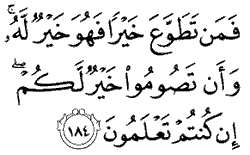Serious Effort, Simple Life, Persuasive Opinions
Issue 946 » May 12, 2017 - Shaban 16, 1438
Living The Quran
Serious Effort
Al Baqara (The Cow) Sura 2: Verse 184 (partial)
 "And whoever does more good than he is bound to do does good unto himself thereby; for to fast is to do good unto yourselves, if you but knew it."
"And whoever does more good than he is bound to do does good unto himself thereby; for to fast is to do good unto yourselves, if you but knew it."
Fasting involves hardship. The word used for doing 'much more' is tatawwu, which has the connotation of spontaneously doing good. It also means acting with effort. These two ideas are also connected with fasting itself: it is both an instinctively good act and one that requires effort. The last part of the verse seems to acknowledge the fact that fasting requires serious effort. The idea of effort in all forms of Muslim worship is crucial. It suggests that as individuals and communities Muslims should inculcate the notion that serious effort is essential for genuine spiritual attainment.
The hardship of fasting, the effort required to refrain from fulfilling the natural desires to eat and drink and suppress numerous other temptations, are undertaken for a higher thirst: the desire to be near God.
Compiled From:
"Reading the Qur'an: The Contemporary Relevance of the Sacred Text of Islam" - Ziauddin Sardar. p. 129
Understanding The Prophet's Life
Simple Life
Prophet Muhammad (peace be upon him) had a generous nature. When, within the space of a few years, his fortunes changed - from being driven out of his hometown, with a great prize on his head, to being the undisputed master of the whole of Arabia - the Prophet could have led a most luxurious life. However, he preferred to lead a simple life, free of all pretences of power, grandeur or material luxury. At times, he could have plenty in his hand, but he would give it all away within a very short period of time. Jabir reports: "God's Messenger never said, 'No', to anything he was asked." Even when he and his family were in need, he would give away whatever he had. He did not mind eating the simplest of food. Anas reports:
I took to the Prophet some barley bread and a little fat that had already started to go bad. He even pawned his body armour with a Jewish pawnbroker to buy some barley for his family. I heard him saying: "Muhammad's family do not have even a small amount of wheat or grains." (Bukhari)
It appears that the Prophet wanted to lead a very simple life, so that he would not be distinguished from the poor in his community. This fits with the Islamic view of this present life as transitory: it is the life to come that is more important, because it is everlasting and people's lots in it are determined by what they do during their present life on earth. Another report that illustrates his interaction with his community is given by Uthman, who says: "We accompanied God's Messenger in travel and in town. He would visit the sick, attend our funerals and fight with us. He would lend us support with whatever he had." (Ahmad)
Compiled From:
"Muhammad: His Character and Conduct" - Adil Salahi
Blindspot!
Persuasive Opinions
Initially, what differentiated one school of law (madhhab) from another were methodological disagreements and not necessarily the actual determinations. With the increasing consolidation and institutionalization of schools of thought, each school developed its own distinctive cumulative interpretive culture, structural precedents, and even particular linguistic practices. Importantly, the founders of the schools of fiqh and the early jurists in general did not intend to generate binding legal precepts. Rather, acting more like law professors and legal scholars, they produced legal opinions and analysis, which became part of the available common law to be adopted by state-appointed judges in light of regional customary practices. Legal scholars from the different schools of thought were often far more interested in hypotheticals that illustrated their analytical models and methodologies than in passing judgments on actual disputes. This is why fiqh studies did not speak in terms of positive legal duties or prohibitions but analyzed legal issues in terms of five values: (1) neutral or permissible (mubah/ halal); (2) obligatory (fard/ wajib); (3) forbidden (muharram); (4) recommended (mandub/ mustahab); and (5) reprehensible or disfavored (makruh). Frequently, jurists spoke in probabilistic terms, such as saying "what is more correct in our opinion," referring to the prevailing view within the jurist's school of thought (al-murajja'a 'indana). The critical point is that the masters of fiqh understood that they were not making binding law but issuing opinions of persuasive authority.
The difference between fiqh and positive law was akin to the distinction between fatwa and hukm. A hukm is a binding and enforceable legal determination, but a fatwa (responsa) is a legal opinion on a particular dispute, problem, or novel issue, which, by definition, enjoys only persuasive authority. Both fiqh and fatawa (sing. fatwa) become binding law only if adopted as such by a person as a matter of conscience or if adopted as enforceable law by a legitimate authority such as a judge. In other words, fiqh and fatawa are normative legal proposals that are contingent on essential enabling acts or triggers: the conscientious acceptance of its mandatory authority by a Muslim practitioner or an official adoption by a proper authority. Failure to appreciate this fundamental point about the construction and structure of the legal views expressed in fiqh works has led to a great deal of ill-informed and misguided scholarship about Islamic law.
Compiled From:
"Reasoning with God: Reclaiming Shari'ah in the Modern Age" - Khaled Abou El Fadl